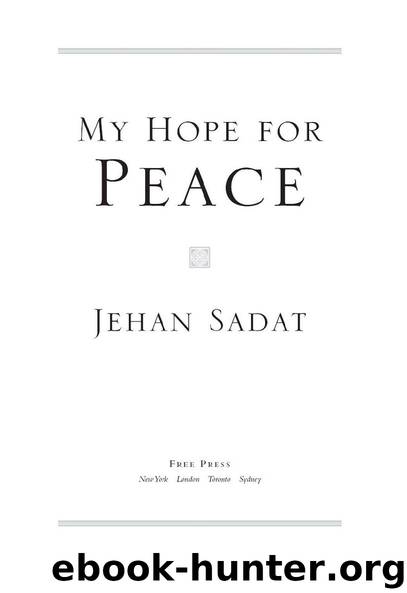My Hope for Peace by Jehan Sadat

Author:Jehan Sadat
Language: eng
Format: epub
Publisher: Simon and Schuster
Published: 2009-07-15T00:00:00+00:00
Leah and I saw each other several times after the death of her husband, and she and I were together for the Norman and Florence Brody Family Public Policy Forum, Two Women of Peace: A Conversation with Leah Rabin and Jehan Sadat, for the University of Maryland. She and I are renowned for our candor, so having both of us together made for a lively, honest dialogue. After that, she and I, along with Farah Diba Pahlavi, the Shahbanu of Iran, were scheduled to attend a dinner sponsored by the Friends of Tel Aviv University. The three of us were being honored for being Women of Peace in the Middle East. Leah, however, was too ill from cancer to attend. Months later, I saw her last television interview, delivered from her deathbed. She was visibly weak in body, but her voice for peace was strong. Immaculately dressed and wearing makeup, with her hair finely coiffed, she strongly urged the Israeli leadership to end the violence in the Middle East. Watching her, I was again full of admiration, and sadness.
In 1996, Leah had campaigned on behalf of Shimon Peres, who, along with Rabin and Arafat, shared the 1994 Nobel Peace Prize for their work on the Oslo agreements. In the wake of Rabin’s death, Peres had served as prime minister for six months and had pledged to continue the peace initiative. Despite Leah’s help, Peres lost. Instead, a string of Hamas suicide bombings in spring 1996 helped propel Likud leader Benjamin Netanyahu into office. Although personally opposed to the Oslo agreements, he nevertheless promised to continue with the implementation of the process to which his country had committed. Time proved that he never sincerely wanted to make peace with Arafat and the Palestinians. Indeed, his three-year administration was marked by actions that undermined the accords: in particular, his decision in 1996 to open a controversial gate between two tunnels in the old City of Jerusalem, which Palestinians believed would endanger the foundations of the nearby Al-Aqsa Mosque, caused days of rioting and dozens of deaths.
When he was voted out, I transferred my hopes to Ehud Barak, who not only had a mandate from his people to make peace, but also expressed his support for Sadat’s bold methods. At last, I thought, we have someone with the will to bring peace. I hoped that with the support of the United States—President Clinton was personally involved in the negotiations—peace in the Middle East might well be within reach. In July 2000, Clinton convened a summit at Camp David with Barak and Arafat. I can still see Barak and Arafat hesitating as they tried to decide who would go in the double door to the meeting room first. On the surface, it was a humorous image, but it also foreshadowed their inability to cross a new threshold.
I, like so much of the rest of the world, was crushed when the 2000 Camp David talks collapsed. I am not certain there is any utility in establishing who was to blame for the failure, or if any single party bears responsibility.
Download
This site does not store any files on its server. We only index and link to content provided by other sites. Please contact the content providers to delete copyright contents if any and email us, we'll remove relevant links or contents immediately.
| Arms Control | Diplomacy |
| Security | Trades & Tariffs |
| Treaties | African |
| Asian | Australian & Oceanian |
| Canadian | Caribbean & Latin American |
| European | Middle Eastern |
| Russian & Former Soviet Union |
The Secret History by Donna Tartt(16622)
The Social Justice Warrior Handbook by Lisa De Pasquale(11489)
Thirteen Reasons Why by Jay Asher(7788)
This Is How You Lose Her by Junot Diaz(5770)
Weapons of Math Destruction by Cathy O'Neil(5036)
Zero to One by Peter Thiel(4824)
The Myth of the Strong Leader by Archie Brown(4789)
Promise Me, Dad by Joe Biden(4447)
Beartown by Fredrik Backman(4415)
Stone's Rules by Roger Stone(4415)
How Democracies Die by Steven Levitsky & Daniel Ziblatt(4398)
The Fire Next Time by James Baldwin(4342)
100 Deadly Skills by Clint Emerson(4076)
A Higher Loyalty: Truth, Lies, and Leadership by James Comey(4032)
Rise and Kill First by Ronen Bergman(4012)
The David Icke Guide to the Global Conspiracy (and how to end it) by David Icke(3881)
The Farm by Tom Rob Smith(3872)
Secrecy World by Jake Bernstein(3782)
The Doomsday Machine by Daniel Ellsberg(3730)
